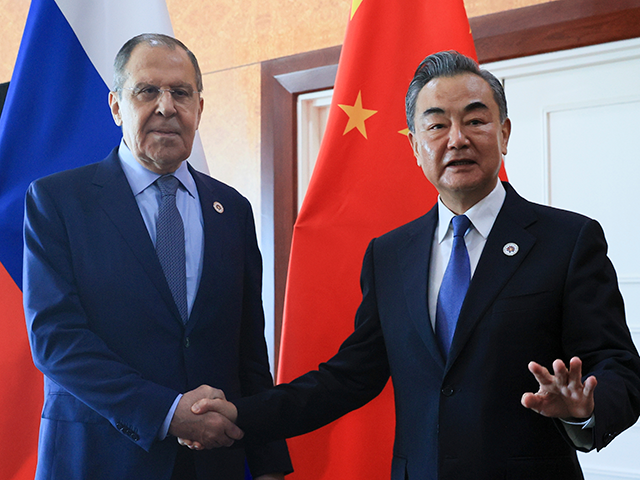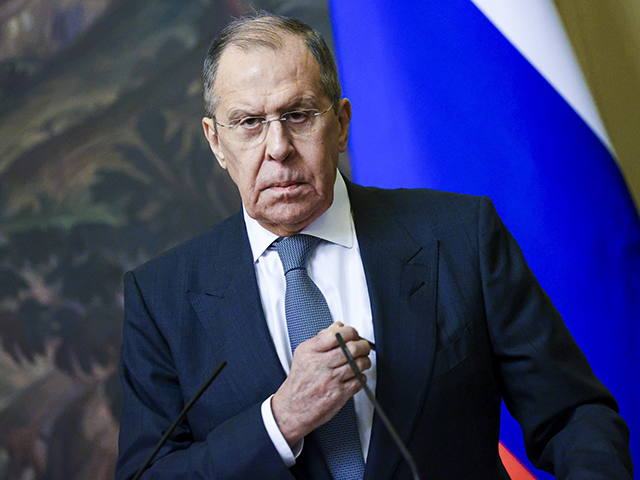Russian Foreign Minister Sergey Lavrov met with Chinese dictator Xi Jinping on Tuesday, paving the way for a meeting between the top Communist Party leader and Russian strongman Vladimir Putin and arriving in between expected visits from American officials Janet Yellen and Antony Blinken.
Xi celebrated relations between Beijing and Moscow as being at their peak as the 75th anniversary of diplomatic relations approaches. Russian officials stated that Lavrov’s visit was in part to prepare for Putin to visit China soon as well as meet with Xi at multiple international events such as the BRICS summit expected in October.
Lavrov arrived in Beijing on Monday as American Treasury Secretary Janet Yellen departed the country. Yellen’s visit was marked by the American official claiming that the “great majority” of trade between China and America is “uncontroversial” and holding to the position of the administration of leftist President Joe Biden that the U.S. government should protect bilateral trade despite China’s rampant intellectual property theft, espionage, use of slavery to flood the American market with cheap goods, and other malign behavior.
In a phone conversation with Xi in early April, Biden reportedly confirmed that Secretary of State Antony Blinken will follow Yellen to China in the near future, though neither the Chinese Foreign Ministry nor the State Department have confirmed dates for the expected trip.
Lavrov reportedly met with both his Chinese counterpart, Wang Yi, and Xi. The Russian news agency Tass quoted Xi as saying at the opening of their meeting that China and Russia were indispensable in “ensuring international justice.”
“This year marks the 75th anniversary of diplomatic relations between China and Russia. Over that period, our countries have embraced peaceful co-existence and mutually advantageous cooperation as two large neighbors,” Xi reportedly said, “which not only brought tangible benefits to the two countries and their peoples but also played a constructive role in ensuring international justice.”
As Lavrov arrived on Monday, the Chinese Foreign Ministry offered few details on what he would be discussing.

File/In this photo released by the Russian Foreign Ministry Press Service, Russian Foreign Minister Sergey Lavrov, left, and Chinese Foreign Minister Wang Yi pose for a photo prior to their talks on the sideline of the 12th East Asia Summit foreign ministers’ meeting in Phnom Penh, Cambodia, on Aug. 5, 2022. (Russian Foreign Ministry Press Service via AP, File)
“Our two sides will exchange views and coordinate positions on the growth of bilateral relations, cooperation in various fields, and international and regional issues of mutual interest,” spokeswoman Mao Ning told reporters, “amid the backdrop of the 75th anniversary of China-Russia diplomatic ties. We will release more information about the visit in a timely way.”
Mao defended China’s friendship with Russia, particularly in the context of Biden administration complaints that Beijing is supportive of Russia’s ongoing invasion of Ukraine, potentially offering both commercial and military backing.
“Relevant countries should not smear or attack the normal relations between China and Russia, and should not harm the legitimate rights and interests of China and Chinese companies. Still less should they shift the blame to China or instigate bloc confrontation,” Mao huffed.
On Tuesday, Lavrov offered Putin’s “warmest greetings” to Xi and vaguely referred to the need to plan “new strategic tasks” between the two countries.
The Chinese state newspaper Global Times, citing its usual stable of regime-approved “experts,” suggested that those tasks could include counterterrorism operations in light of the massive Crocus City slaughter in Moscow in March and a growing number of terrorist attacks on Chinese Belt and Road Initiative (BRI) projects in Pakistan, the latest a suicide bombing that killed five Chinese engineers in late March.
“Russia just experienced a horrific terrorist attack in Moscow, and the attackers are from Central Asia. Chinese engineers in Pakistan have also been attacked by terrorists in the region, so both China and Russia share common concerns about terrorism, said analysts,” according to the Global Times.
The state newspaper also noted the timing of Lavrov’s appearance, sandwiched in between key American officials making appearances in Beijing. Chinese “expert” Cui Heng was quoted as calling the timing “very interesting,” stating it “shows the complexity of the interactions between China, Russia and the US, and in the trilateral relations, China is driven by its own national interests.”
The Kremlin confirmed that Lavrov’s visit would precede in-person meetings between Xi and Putin in the near future.
“Certainly, this trip [by Russian Foreign Minister Sergey Lavrov to China] can be viewed as preparations for upcoming interaction at the highest level. Indeed, such interaction is in the works,” top Kremlin spokesman Dmitry Peskov told reporters on Tuesday.
Peskov stated that it was “still premature” to confirm the exact date and location of those meetings, but Lavrov himself, following his meeting with Chinese Foreign Minister Wang Yi, said that at least two of them would take place at the Shanghai Cooperation Organization (SCO) meeting in July and the scheduled summit of BRICS countries in October. The BRICS meeting will be the first of its official summits to include its new members. Russia – along with India, China, Brazil, and South Africa – welcomed Iran, Ethiopia, Egypt, and the United Arab Emirates (UAE) to the coalition in January. Argentina received an invitation but declined; Saudi Arabia nominally accepted the invite but has reportedly not completed the paperwork to become a member.
Lavrov said that Xi and Putin may also “maintain regular political dialogue” in other meetings; some reports suggested Putin could visit Beijing as early as May.
Lavrov arrived just as Yellen left a largely friendly visit to the country. Chinese state media obsessed over Yellen’s food choices while in the country and amplified Yellen’s calls for protecting many aspects of trade between the two countries.
“I think trade and investment between China and the United States is valuable,” Yellen told CNBC in an interview aired on Monday. “Many American companies are doing excellent business in China, have been here for a long time. The same is true of Chinese companies in the United States, and this trade is beneficial and the great majority of it is uncontroversial. And I think we should not do anything to impede that trading and investment relationship.”
Yellen’s remarks align with what Biden reportedly told Xi in his early April phone call.
“The U.S. does not want to curtail China’s development, and does not seek ‘decoupling’ from China,” the Chinese state news outlet Xinhua paraphrased Biden as saying. “President Biden reiterated that the United States does not seek a new Cold War, its objective is not to change China’s system, its alliances are not targeted against China.”
At a press conference shortly before leaving Beijing, Yellen claimed that the Biden administration would nonetheless “not accept” the Chinese government flooding hurting the U.S.
“When the global market is flooded by artificially cheap Chinese products, the viability of American and other foreign firms is put into question,” she said. “I’ve made it clear that President Biden and I will not accept that reality again.”
Blinken’s visit, which does not have a publicly known date at press time, will likely focus on China-Russia relations, and China’s role in the Ukraine invasion specifically, judging from Blinken’s recent comments on China.
“More aid is urgently needed for Ukraine. We heard directly today from Foreign Minister Kuleba every day without further assistance puts Ukraine’s defenders and its civilians in greater peril,” Blinken told reporters on April 5. “Our support is especially important as a number of countries are helping Russia build up its defense industrial base and continue to perpetrate its aggression on Ukraine. China continues to provide materials to support Russia’s defense industrial base.”

COMMENTS
Please let us know if you're having issues with commenting.